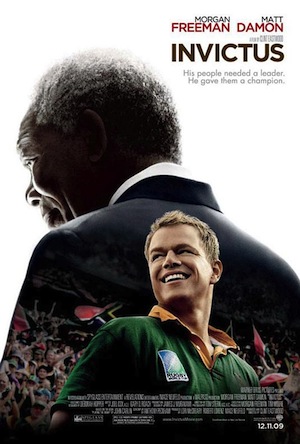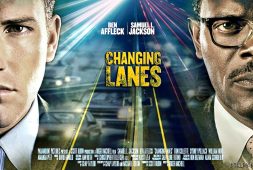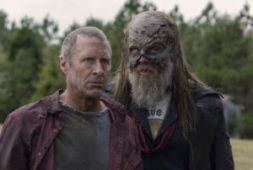
Main Point of Discussion: Through Christ we can make peace with our enemies.
The Movie Clip: Invictus is a powerful movie with many clips that provoke discussion. It features Morgan Freeman as Nelson Mandela, the black South African leader and activist who was released from prison in 1990 after serving 27 years and, in 1994, elected president. The film focuses on Mandela just after he takes office and his friendship with the white captain of South Africa’s rugby team whose 1995 World Cup win helps bring the racially divided nation together.
Incidentally, the word invictus is Latin for “unconquered.” It’s also the title of a Victorian-era poem that inspired Mandela while he was imprisoned. The poem is referenced in the movie several times and is a bridge between Mandela and the rugby captain, François Pienaar (played by Matt Damon), leading up to the team’s triumph.
The clip we’re using for this discussion is from the beginning of the movie, just after Mandela assumes presidential duties. Lead bodyguard, Jason Tshabalala, is organizing security for Mandela and has requested additional bodyguards. It’s important to note that the skin color of Mandela’s inner-circle has been decidedly black to this point—but that’s about to change. Tshabalala (understandably) doesn’t like it. Mandela, however, challenges his distrust.
Introducing the Clip:
Today I want to show you a clip from the movie Invictus. Some of you may have seen this movie already, but for those who haven’t, it features Morgan Freeman as Nelson Mandela, the black South African leader and anti-Apartheid activist who was released from prison in 1990 after serving 27 years and later elected president. The film focuses on Mandela just after he takes office and his friendship with the white captain of South Africa’s rugby team, whose 1995 World Cup win helps bring the racially divided nation together.
The clip we’re about to watch is from the beginning of the movie, just after Mandela assumes presidential duties. Mandela’s lead bodyguard is organizing security and has requested help. It’s important to keep in mind that the skin color of Mandela’s inner-circle has been noticeably black to this point—but that’s about to change, and Mandela’s bodyguard doesn’t like it. Mandela, however, challenges his distrust. Let’s take a look at this scene.
Scene Script:
BEGIN CLIP AT 12:53 (chapter 4) just after bodyguard walks from assistant’s desk into his own office.
Jason Tshabalala: (walking into his office, speaking to fellow bodyguards) We need more men.
Bodyguard #1: Did you talk to Brenda about it?
Jason Tshabalala: Yes, yesterday. (hears door knock) Ah, that must be Jessie with the schedule. Come in, beautiful! (taken aback by four official-looking white men walking through door) What’s this?
Captain Feyder: Mr. Jason Tshabalala?
Jason Tshabalala: That’s me. Am I under arrest?
Captain Feyder: Captain Feyder and team reporting for duty, sir.
Jason Tshabalala: What duty?
Captain Feyder: We’re the Presidential Bodyguard. We’ve been assigned to this office. Here are our orders. (hands Tshabalala a letter)
Bodyguard #1: You’re Special Branch, right? (another white bodyguard nods back silently)
Captain Feyder: (to Tshabalala) You’ll see that they’ve been signed.
Jason Tshabalala: I don’t care if they’re signed… (abruptly stops speaking after noticing Nelson Mandela’s signature at bottom of letter) Just wait here. (Tshabalala leaves office to talk with Mandela)
Jason Tshabalala: (walking into Mandela’s office) Sorry to disturb you, sir.
Nelson Mandela: You look agitated, Jason.
Jason Tshabalala: That’s because there are four Special Branch cops in my office.
Nelson Mandela: Oh, what did you do?
Jason Tshabalala: Nothing. They say they are the Presidential Bodyguards and have orders signed by you. (hands Mandela the letter)
Nelson Mandela: Ah, yes. Ah, yes. These men are special trained by S.A.S. They have lots of experience. They protected de Klerk.
Jason Tshabalala: Yes, Madiba, but that doesn’t mean they have to come into…
Nelson Mandela: You asked for more men, didn’t you?
Jason Tshabalala: Yes, sir, I asked…
Nelson Mandela: When people see me in public, they see my bodyguards. You represent me directly. The Rainbow Nation starts here. Reconciliation starts here.
Jason Tshabalala: Reconciliation, sir?
Nelson Mandela: Yes, reconciliation, Jason.
Jason Tshabalala: Comrade President, not long ago these guys tried to kill us. Maybe even these four guys in my office tried and often succeeded.
Nelson Mandela: Yes, I know. Forgiveness starts here, too. Forgiveness liberates the soul. It removes fear. That is why it is such a powerful weapon. (pauses, puts arm around Tshabalala’s shoulder) Please, Jason…try.
Jason Tshabalala: (pauses) Sorry to disturb you, sir.
END CLIP AT 14:48, just as Tshabalala leaves Mandela’s office.
Transitional Statement:
In this scene the bodyguard, Jason, is faced with a hard task: Forgiving and reconciling with and making peace with his enemies. And we’re not talking about personality clashes here or guys who just rub him the wrong way—the four white bodyguards who walk into his office represent an oppressive, racist regime that killed and otherwise harmed countless black South Africans during the years of Apartheid. And now Jason has to forgive them and reconcile with them and make peace with them? Just like that? Well, that’s what Mandela is asking him (and, by extension, other black South Africans) to do.
Divide into Small Groups:
Let’s go ahead and split up into our discussion groups, and then afterward we’ll come back together for a final word.
CLICK HERE for a quick training article on how to maximize your small groups using our small group format—a great resource to equip your small group leaders.
Discussion Questions:
- AROUND THE CIRCLE: Before we begin, tell everyone your name and if you’ve ever seen a rugby match in person.
- ASK A FEW: In the scene we just watched, Jason is totally thrown for a loop because Mandela is making him work with white bodyguards. It’s unacceptable to him, and he’s visibly upset by being put in this position. Have you ever been forced to work with or make peace with someone you couldn’t stand? If so, what did you say? What was the outcome?
- ASK A FEW: In the clip, Mandela says “reconciliation starts here…forgiveness starts here, too.” In other words, Mandela will lead by example in the struggle to bring a racially divided South Africa together—and Jason finds himself, because of his job, on the front line of this national example-setting. Have you ever found yourself, because of your position or friendships or family relationships, on the front line of setting an example? If so, can you tell us what it was about and how it turned out?
- ASK A FEW: It’s easy to understand why Jason is so distrustful of the new white bodyguards—when an identifiable group of people is responsible for bringing harm and misery to you or your fellow countrymen, anger and distrust are the natural reactions. Can you recall a time in U.S. history when this was (is) the case? Can you recall a time in your life when you felt this way about a person or a group of people? Do you feel the same way now?
- ASK A FEW: In the clip, Mandela says that forgiveness is “a powerful weapon.” If Mandela means to make peace with his enemies, then against who or what do you suppose Mandela wants to use the “weapon” of forgiveness? (leader—the answer you may be looking for: Against people’s own fears and hatred)
- ASK A FEW: Early in this passage, Paul makes a subtle reference to the early church practice of Jewish Christians denying Gentile Christians full citizenship in God’s family until they became circumcised. In verse 13, how did Christ bring the uncircumcised Christians “near”? (leader—the answer you’re looking for: Through the blood of Christ)
- ASK A FEW: Does verse 13 mean that Jewish Christians weren’t “once far away” and didn’t need to be “brought near through the blood of Christ”? Are the Jewish Christians saved because of their circumcision? (leader—the answer you’re looking for: No, just like the Gentile Christians, they’re saved only through the blood of Christ)
- ASK A FEW: In verse 14, the “he” who Paul writes about is Jesus. What does it mean to you that Jesus “is our peace”? (leader—the answer you may be looking for: Peace is something that Christ gives believers because of who he is and what he’s done, not because we’re so great at making peace on our own)
- ASK SOMEONE: What has Jesus accomplished, according to this passage? (leader—the answer you’re looking for: made the two into one, destroyed the barrier and dividing wall of hostility, abolished in his flesh the law with its commandments and regulations, reconciled in his body the two parties at odds, put to death hostility on the cross)
- ASK A FEW: What similarities are there between the treatment of Gentile Christians by Jewish Christians and the treatment of black South Africans by white South Africans? (leader—the answer you may be looking for: Discrimination because of a physical difference led to hatred and mistrust)
- ASK A FEW: Verse 15 (“by abolishing in his flesh the law with its commandments and regulations”) refers to circumcision no longer being part of God’s requirements since Jesus instituted a new way of living. Can you think of another Old Testament law that’s been abolished and replaced with Christ’s new law—one that speaks not just to the premise of Invictus, but also to how all of us ought to treat each other? (leader—the answer you may be looking for: “An eye for an eye” has been replaced by “love your enemies”)
- ASK A FEW: The following part of the passage seems very applicable to South Africa: “His purpose was to create in himself one new man out of the two, thus making peace, and in this one body to reconcile both of them to God through the cross, by which he put to death their hostility.” Do you believe all hostility between blacks and whites is gone in South Africa? In America? Other countries? Why or why not? (leader—the answer you may be looking for: No, because not enough believers are living into Jesus’ declaration of peace, forgiveness, and reconciliation)
- ASK A FEW: Nelson Mandela’s demonstrations of peace, forgiveness, and reconciliation toward white South Africans were incredible acts. Mandela has also made public professions of his faith in Christ. What would you hope he would say when asked, “Where does your strength to make peace and forgive come from?” (leader—the answer you’re looking for: The blood of Christ, what Jesus already accomplished on the cross, because Christ first forgave and made peace with me, etc.)
- ASK A FEW: As Christians, shouldn’t it always be easy to make peace with our enemies and reconcile with them and forgive them? (leader—the answer you’re looking for: Not necessarily) If it’s not always easy, how can we make it easier? (leader—the answer you may be looking for: By reminding ourselves of where our power to make peace and forgive comes from—Jesus himself and the sacrifice he made on the cross)
Read the following passage:
Ephesians 2:11-16 (NIV)
11Therefore, remember that formerly you who are Gentiles by birth and called “uncircumcised” by those who call themselves “the circumcision” (that done in the body by the hands of men)—12remember that at that time you were separate from Christ, excluded from citizenship in Israel and foreigners to the covenants of the promise, without hope and without God in the world. 13But now in Christ Jesus you who once were far away have been brought near through the blood of Christ.
14For he himself is our peace, who has made the two one and has destroyed the barrier, the dividing wall of hostility, 15by abolishing in his flesh the law with its commandments and regulations. His purpose was to create in himself one new man out of the two, thus making peace, 16and in this one body to reconcile both of them to God through the cross, by which he put to death their hostility.
Wrap Up:
Tonight we’ve been looking at our power to make peace with, reconcile with, and forgive our enemies—specifically because Jesus already did the work in this area and offers his power to us! That’s right—all of Jesus’ power to love our enemies is already ours if we’re followers of Jesus. He just handed it over to us when we invited him into our lives.
But making peace and forgiving and reconciling aren’t always easy, even when Jesus’ power is readily available to us. Why? Because we’re still frail human beings who don’t always do the right things or see the obvious help right in front of us. We need reminders all the time. And making peace with our enemies can also be difficult because maybe the wrongs done to us are deeply painful. In the case of Nelson Mandela and his fellow black South Africans, they were physically, psychologically, and socioeconomically oppressed by a racist white regime for decades—poverty, hopelessness, beatings, murder. That’s a lot to forgive, but Mandela—a professed believer in Christ—demanded it of himself and others.
It’s one thing, however, to know the right thing to do and another to actually carry out that right thing to do. Maybe you’re dealing with an unresolved conflict right now (or maybe it’s been months or years since you last thought about your unresolved conflict). First, don’t beat yourself up about it. Jesus died and rose again so you could be free from the sin of beating yourself up—don’t insult him by keeping that flame lit. Second, pray. Ask God to search your heart and soul for anything unclean or impure in your life, call you on it, and help you get rid of it. Third, search out that person you’re in conflict with—and ask forgiveness for your role in the conflict.
A few cautions: You may not get the response you’re hoping for (i.e., the other person may not acknowledge his or her role in the conflict or ask for your forgiveness). If this happens, there’s not much you can do except pray and let it go. But if you’re relationship with this person is otherwise strong, you might later approach him or her and mention how you feel. The other thing to keep in mind: Perhaps your pain and hurt is too deep and private. In cases where you’ve been abused physically or sexually, make sure you talk to me or one to the other adult leaders before you attempt any peacemaking. We have extra resources that can help you understand what happened to you and get you in the right frame of mind before going forward.
So now, let’s bow our heads so we can think about ourselves and not those around us. As you sit there with your eyes closed and head bowed, I want you to think about the areas where you need to make peace, forgive, and reconcile with someone else. Then I want you to thank God for pointing them out to you, as well as for all the chances God will give you to carry out his commands. And remember that I or one of the other adult leaders can help you identify Scriptures that can strengthen you—and we’ll always be praying for you.
Close in Prayer
Jonathan McKee
Jonathan McKee is the author of over twenty books including the brand new The Guy's Guide to FOUR BATTLES Every Young Man Must Face; The Teen’s Guide to Social Media & Mobile Devices; If I Had a Parenting Do Over; and the Amazon Best Seller - The Guy's Guide to God, Girls and the Phone in Your Pocket. He speaks to parents and leaders worldwide, all while providing free resources for youth workers on TheSource4YM.com. Jonathan, his wife Lori, and their three kids live in California.



